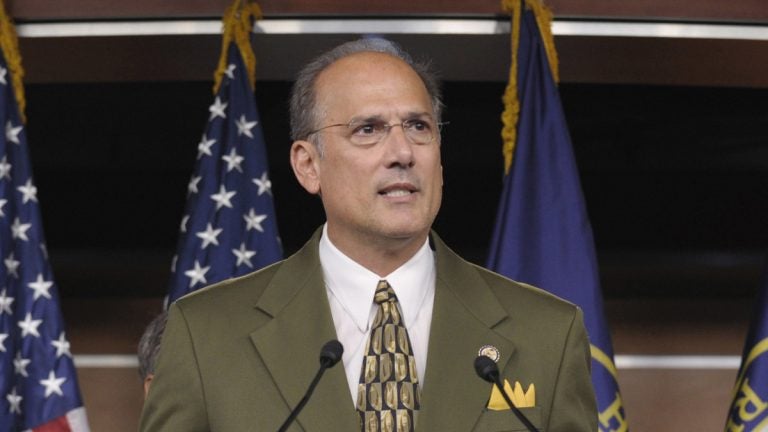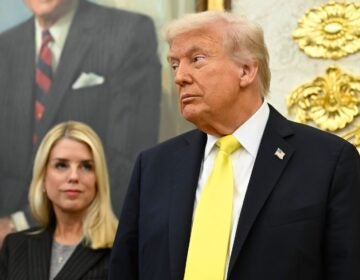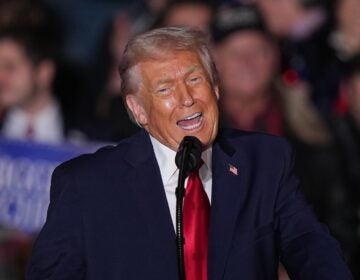The free press exposes Trump swamp creature Tom Marino
Let's briefly pause to celebrate the speedy downfall of a Trump apparatchik. Because it speaks to the resilience of our democratic institutions.

In this Sept. 23, 2011 file photo, Rep. Thomas Marino, R-Pa., speaks during a news conference on Capitol Hill in Washington. (Susan Walsh/AP)
Before we inevitably face the next phantasmagoria — Trump, attempting words of comfort, reportedly told a war widow yesterday that her dead husband “knew what he signed up for” (and, natch, Trump claims to have “proof” that he never said it) — let’s briefly pause to celebrate the speedy downfall of a Trump apparatchik. Because it speaks to the resilience of our democratic institutions.
On Sunday, the free and independent press — The Washington Post, partnering with CBS News’ “60 Minutes” — reported in great detail that Trump’s choice to head the Drug Enforcement Administration, Pennsylvania congressman Tom Marino, was a drug industry toady who’d worked for two years to undercut the DEA’s efforts to combat the burgeoning opioid crisis. On Monday, Trump acknowledged that “we’re going to look into the report, and we’re going to take it very seriously.” And on Tuesday, Marino said he no longer wished to helm the DEA.
That’s how accountability journalism is supposed to work. In this particular case, the evidence against Marino was so strong that it prompted Trump to park his pap about “Fake News.” Far from fulfilling his so-called promise to “drain the swamp” in Washington (a promise he broke long ago), he got caught trying to hire another swamp creature, and, amazingly, this time he didn’t respond by digging his hole deeper.
The gist of the story — in case you missed it, amidst Trump’s lies about Obama supposedly not calling war widows — is that Marino has long been “a friend on Capitol Hill of the giant drug companies that distribute the pain pills that have wreaked so much devastation around the nation.” On behalf of those companies, he successfully championed a law that makes it far tougher for the DEA to speedily stop those drugs from getting to the street.
Reportedly, Marino’s law is “the crowning achievement of a multifaceted campaign by the drug industry to weaken aggressive DEA enforcement efforts against drug distribution companies that were supplying corrupt doctors and pharmacists who peddled narcotics to the black market.” Prior to the law (which President Obama signed, so he rates a share of responsibility), the DEA had broad authority to halt drug shipments that it deemed to be an “imminent danger” to a community. But under Marino’s law, the DEA can’t halt shipments unless it can prove that the drugs pose “a substantial likelihood of an immediate threat.” As a DEA whistleblower told the journalists, “There’s no way that we could meet that [higher] burden … because ‘immediate,’ by definition, means right now.”
Why didn’t Trump condemn the Marino stories and retaliate in his usual manner? Perhaps it’s because The Post’s story was amplified by the parallel “60 Minutes” investigation that reportedly reached more than 13 million viewers, and if there’s one thing Trump respects, it’s ratings. Or perhaps Trump realized that it was stupid to sponsor someone who’d undercut the fight against opioids — after having reaped a lot of ’16 votes in struggling communities devastated by opioids.
All of which prompts us to ask a few questions:
What can possibly explain the political stupidity of the Trump team — choosing a DEA leader who’d done the drug industry’s bidding, weakening the DEA’s efforts to help the very communities that fueled Trump’s thin Electoral College win? What kind of vetting process produces a Tom Marino?
Thanks to the free and independent press, the administration’s tone-deaf ineptitude has been exposed anew. And this latest vetting fiasco fits the longstanding pattern. Trump’s second Army Secretary nominee had to pull his name after it was discovered that he’d made a slew of disparaging remarks about gays, Muslims, and Latinos. Trump’s first Army Secretary nominee, a Wall Street billionaire, withdrew rather than face scrutiny for potentially benefiting from federal contracts. Trump’s first Navy secretary nominee, a private equity investor, dropped out rather than divest his business holdings. Trump’s first Labor secretary nominee, a wealthy restaurant executive, withdrew his name amidst attacks on his labor record (he opposed minimum wage hikes) and his personal hiring practices (he’d employed an undocumented worker). And of course this list doesn’t include notables like Michael Flynn, the short-lived national security adviser who somehow got vetted for that job despite his long track record toadying for Russia.
The good news is that Trump is at least prone to being held accountable. On Fox News Radio yesterday, he duly lauded Marino (“a supporter of mine from Pennsylvania, I won Pennsylvania”) and said that Marino told him that “if there is even a perception of a conflict of interest, he doesn’t want anything to do with it,” which we can take as Trump’s tacit acknowledgment that The Post and CBS News stories were correct.
Granted, he was back online yesterday with his rote rant — tweeting about “so much Fake News” in places like CBS News. “Fiction writers!” — but that’s fine. Bluster is no match for accountability journalism.
WHYY is your source for fact-based, in-depth journalism and information. As a nonprofit organization, we rely on financial support from readers like you. Please give today.




